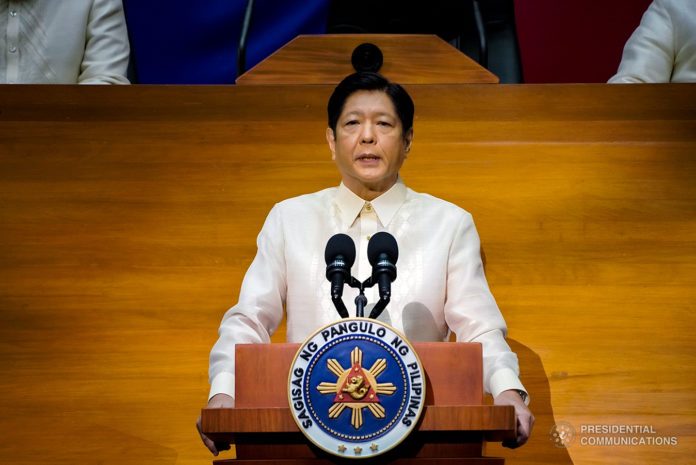PRESIDENT Ferdinand “Bongbong” Marcos Jr. has vowed to increase agricultural and energy production in his term by pardoning farmers’ existing land loans and expanding the country’s power sources.
Marcos Jr., who is also the temporary chief of the Department of Agriculture, said he would issue a one-year moratorium on amortization and interest payments of agrarian reform beneficiaries to help farmers focus more on production.
“A moratorium will give the farmers the ability to channel their resources in developing their farms, maximizing their capacity to produce, and propel the growth of our economy,” Marcos said during his first State of the Nation Address (SONA) on Monday, July 25.
He also called on Congress to pass a law amending Republic Act 6657 or the Comprehensive Agrarian Reform Law of 1998 to free farmers from their debts.
“In this law, the loans of agrarian reform beneficiaries with unpaid amortization shall be condoned. Layunin ng batas na ito na burahin ang hindi mabayarang utang ng ating mga magsasaka na benepisyaryo ng agrarian reform,” Marcos Jr. said.
“Agrarian reform beneficiaries who are still to receive their awarded land under the comprehensive agrarian reform program shall receive it without any obligation to pay any amortization,” he continued.
Marcos said condoning the loans would benefit a total of 654,000 farmers as it would cover P58.125 billion and involve a total of 1.18 million hectares of awarded land.
He said the government would also distribute 52,000 hectares of unused agricultural land owned by the government to landless war veterans and their surviving spouses and orphans, retirees of the Armed Forces of the Philippines and the Philippine National Police, and graduates of agricultural programs, as provided by existing laws.
Marcos also promised to modernize the agriculture sector with the latest technology to increase farm yields and resilience to the effects of climate change.
According to a report by debt watcher Moody’s Investors Service, the war between Russia and Ukraine has made the Philippines, alongside other Asia-Pacific countries, “highly vulnerable” to volatile food and energy prices because of its dependency on imports.
The Philippine Chamber of Agriculture and Food Inc. also said it was possible a food shortage could hit the country by the fourth quarter of the year, during the holiday season.
Expanding power sources
To address the growing demand for energy in the country, the President wants to expand the country’s energy production, mixing traditional and renewable energy and noting solar power’s practicality in the country.
“At present, our demand for energy far exceeds our reliable supply. We must increase the level of energy production… We must build new power plants. We must take advantage of all the best technology that is now available, especially in the areas of renewable energy,” Marcos said.
The most “particularly attractive” energy source for the Philippine setup, Marcos said, was solar power, as it “is practical almost everywhere in the Philippines all year round.”
“Our search for new power sources should always be with an eye to improving the energy supply mix between traditional and renewable sources,” he added.
Marcos said he also wanted to review the Philippines’ strategy in building nuclear power plants, vowing to comply with the regulations set by the International Atomic Energy Agency in building nuclear power plants.
Former President Rodrigo Duterte earlier said he hoped Marcos Jr. would explore the use of nuclear energy as his father, the late dictator Ferdinand Marcos Sr., was behind the construction of the Bataan Nuclear Power Plant.
The Bataan Nuclear Power Plant, which cost more than $2 million, was the country’s only nuclear power plant.
Completed under the Marcos Sr. regime, it was never fueled nor used due to safety concerns. After Marcos was overthrown and in the wake of the 1986 Chernobyl Nuclear Power Plant disaster, the succeeding administration of President Corazon Aquino mothballed the Bataan plant.
Marcos Jr. also wants a review of the system of transmission and distribution of electricity to consumers as he seeks to lower rates.
“We must expand the network of our transmission lines while examining schemes to improve the operation of our electrical cooperatives. All this in aid of reducing energy cost, especially but not limited to households,” Marcos said.
No more lockdowns
Despite the extant threat of the Covid-19 pandemic, Marcos is not keen on imposing lockdowns in the country.
“Hindi na natin kakayanin ang isa pang lockdown. Dapat nating balansehin nang maayos ang kalusugan at kapakanan ng ating mga mamamayan sa isang banda, at ang ekonomiya naman sa kabilang banda,” Marcos said.
He said the government would continue its vaccine booster rollout to protect Filipinos and study how to improve the implementation of the alert level system.
“I-aayon natin ang ating health protocols sa kung ano ang ating pangangailangan sa paglipas ng panahon at lalo pang i-ibayuhin ang kooperasyon kasama ang pribadong sektor upang tumaas pa ang kumpyansa ng mga mamumuhunan, nang sa gayon ay bumalik na sa full capacity ang mga negosyo,” the President said.
To sustain economic recovery, Marcos bared his medium-term fiscal strategy, which he said would guide legislators in the next six years in preparing annual budget plans and implementing sound fiscal management.
He noted that other issues intertwined with the economy might have lasting effects if they remained unresolved, such as climate change.
“If we cannot mitigate climate change, all our plans for the economy, for our future, will be for naught,” he warned.
F2F classes, economy
Reiterating his support for the resumption of face-to-face (F2F) classes, Marcos Jr. said students should now return to the classroom after two years of enduring the virtual setup.
“I believe it is time for our children to return to full face-to-face classes once again,” the President said.
The Department of Education earlier announced that five-day F2F classes would begin on Nov. 2 for both public and private basic education schools.
The Commission on Higher Education (CHEd) meanwhile said higher education institutions would not be required to conduct F2F classes this upcoming academic year as they had the authority to decide for themselves whether to hold F2F classes or not.
Although vaccination remains optional, Marcos Jr. encouraged participants of F2F classes to get their booster shots.
“We must ensure that our classrooms are safe for teachers, for students, and the entire academic community when they return to face-to-face classes. We continue to encourage everyone to get their booster shots in preparation for the resumption of in-person classes,” he urged.
According to the National Economic and Development Authority, the resumption of in-person classes could generate P12 billion weekly for the economy as it would also lead to the reopening of more businesses and the utilization of transportation.
To further boost the economy, Marcos Jr. also promised to continue and expand the infrastructure projects started by Duterte and make “basic developments” for tourism, such as road improvements and the creation and upgrading of airports.
He said he had instructed the Department of Social Welfare and Development to better prepare for disasters and vowed to add more operation centers and warehouses, wherein relief goods would be stored and easily distributed when a disaster strikes.
The President capped his 78-minute address by urging the 19th Congress to pass the following bills:
- National Government Rightsizing Program
- Budget Modernization Bill
- Valuation Reform Bill
- Passive Income and Financial Intermediary Taxation Act
- E-Government Act
- Internet Transaction Act or E-Commerce Law
- Government Financial Institutions Unified Initiatives to Distressed Enterprises for Economic Recovery (GUIDE)
- Establishment of the Medical Reserve Corps
- Creation of the National Disease Prevention Management Authority and the Philippine Center for Disease Prevention and Control
- Creation of the Virology Institute of the Philippines
- Creation of the Department of Water Resources
- Unified System of Separation, Retirement and Pension
- E-Governance Act
- National Land Use Act
- National Defense Act
- Mandatory Reserve Officers’ Training Corps (ROTC)
- Enactment of an Enabling Law for the Natural Gas Industry
- Amendments to the Electric Power Industry Reform Act
- Amendments to the Build-Operate-Transfer Law
People’s SONA
In the morning, a people’s SONA was conducted along Commonwealth Ave., where progressive groups dared Marcos Jr. to escape his predecessor and father’s shadow.
“Ito ay mga hamon namin na patunayan niya na siya ay hindi si Duterte, patunayan niya na hindi siya another Marcos Sr., at may kakaibang katangian siya na ipatupad at galangin ang kahilingan ng manggagawang Pilipino at ng mamamayang Pilipino,” Elmer Labog, Kilusang Mayo Uno chairperson, said.
More than 8,000 protestors carried effigies and raised placards expressing their fear of and discontentment with Marcos Jr.’s leadership.
They sought better wages and working conditions for laborers, an end to the red-tagging of the opposition, concrete economic plans and upholding freedoms such as that of the press.
Supporters of the president, meanwhile, gathered at the other side of the avenue to express their support, donning red and green clothing that symbolized Marcos Jr.’s campaign. Eduelle Jan T. Macababbad















